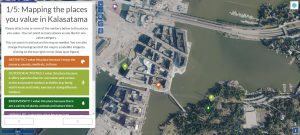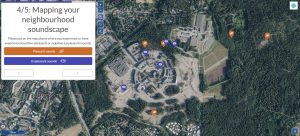Silviya Korpilo, PhD
Outdoor recreational areas provide us a range of experiences especially when we find ourselves surrounded by nature. There has been a focus in research and planning on the visual features of urban landscapes. Yet, we hear places as much as we see them.
Researchers from the Human-Nature Transformations group are studying how citizens perceive and experience their everyday living environment through different senses. How pleasant, disruptive or restorative are views of the forests or views of the sea? How pleasant or unpleasant are the sounds of children playing in a residential yard or bird songs along a daily walk?
In the study, Public Participation GIS (PPGIS) data is collected from local residents living in the two rapidly developing neighbourhoods in Helsinki – Kalasatama and Kuninkaantammi. Residents are asked about the importance, values, and meanings of different green and blue spaces in these areas. They are also asked to map pleasant and unpleasant sounds in their neighbourhood. The survey collects valuable social data on how to plan and manage healthy and attractive urban green spaces, while also accommodating for citizens’ well-being and recreational needs. 

Volunteers can take part in the online surveys by using the following links: mpt.link/smartgreen_kalasatama and mpt.link/smartgreen_kuninkaantammi
The survey is open from March 2021 until May 2021. It is conducted by University of Helsinki, in partnership with the Finnish Environment Institute (SYKE) and Forum Virium Helsinki (City of Helsinki).
For more information about the survey, contact Silviya Korpilo at silviya.korpilo(at)helsinki.fi.
About the author
Silviya is a post-doctoral researcher who studies human-nature connections in cities from a socio-ecological-technological systems perspective and particularly how participatory GIS methods can support planning and management of urban green spaces. Her research interests also include multisensory methods for studying human experiences in urban nature, environmental justice and using new technologies to capture and analyse urban green space use. She is currently working on the Smarter Greener Cities project examining the links between landscape and soundscape quality and psychological restoration. You can follow Silviya on ResearchGate.